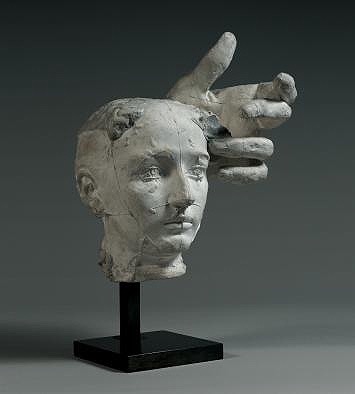DisAssemblage

Auguste Rodin: ASSEMBLAGE: MASK OF CAMILLE CLAUDEL AND LEFT HAND OF PIERRE DE WISSANT (Circa 1895)
"I will first view her art in the moment of its destruction …"
The Muse spent the day wrapping and packing 'her' dishes, emptying the two towering china cabinets, disassembling, engaging in an art form perhaps properly called DisAssemblage. Much dissembling accompanied her work, for it demanded that she at least act grown up and dedicate herself to creating an inevitably short-lived result. A few short weeks from now, she'll be disassembling her DisAssemblage to repopulate her two towering china cabinets, flattening sheets of packing paper to be passed on for someone else's DisAssemblage effort. Still, she dedicated herself to proper technique, trusting no one else's eye to protect her treasures, each piece lovingly placed within sealed boxes, an unseen result nonetheless steadfastly produced. We will pray for careful movers and safe storage for these treasured pieces of unseen artwork. ©2021 by David A. Schmaltz - all rights reserved
There are unwritten rules for creating such fleetingly-seen artworks. The artist might be the most important patron, for few besides the creator will ever experience the work or have reason to appreciate it. It might mostly be created to please the artist, and the artist must be exacting while dissembling. She's destroying an order which evolved over time, preserving the components for later re-ordering. Much must remain unknown throughout the operation and she must strike a balance. Too much diligence and she's dabbling into over-protection which could result in the creation of un-unwrappable packaging, the kind in which gifts from a skittish spinster aunt tend to arrive, swimming in Scotch tape-spoiled packing peanuts, more medium than messaging. Too little diligence and a treasure's trashed in transit. She sent me out for more packing paper twice and she gratefully avoided the packing peanut trap, which leaves altogether too much crap to try to dispose of on the other end of the trip.
I kept my distance, limiting my involvement to occasional praising and carting finished cartons to short-term storage. She dredged the depths of the cabinets. She alone decided which pieces warranted a dishwasher run before wrapping. I fled to find more dishwasher detergent, an unlikely knight errant essential to her producing successful creations. I asked her if she'd rediscovered anything while creating her DisAssemblage, and she surprisingly said that she had not. She had apparently maintained awareness of her entire trove, though she did discover a few items with which she was finally ready to part. These received no DisAssemblage but were dispatched largely unwrapped into unpadded boxes for their short trip to the Goodwill drop-off, there to shortly become someone else's treasures, raw material for their future DisAssemblage efforts. In the life cycle of the typical treasure, each will receive this special treatment a blessedly few times, each instance a reinforcement of that treasure's true value and of its owner's continuing commitment. DisAssemblage is inescapably and always an act of true devotion and love.
I treat my treasures less lovingly. Some, I cannot bear to even gaze upon, longingly or otherwise. I have for years kept a This Cannot Be Undone Box, in which I keep certain keepsakes. I cannot bear to open that box lest it dredge up nostalgia and deep regrets, yet I have dragged it along through several dismemberments and relocations, keeping it in an innocuous bottom desk drawer between moves. It's not a work of art. It's not a shrine to devotion. It's never DisAssembled or re-displayed, but hidden away like some light beneath a bushel basket. I imagine The Muse's DisAssemblage displayed in a sleek gallery, with patrons of this under-appreciated art form flooding the place to catch inspiring glimpses while quietly swearing that next time, they will attend this carefully to the treasures they possess when they move. But nobody, not even me, will ever see these fine pieces, nobody except The Muse herself. I averted my eyes through their creation, feeling unworthy of witnessing her work. I might help unwrap the pieces when we unpack, while she carefully places them back into her two towering china cabinets for display. I will first view her art in the moment of its destruction and feel grateful then for her care and attention to an art form this world's all but forgotten.


